Monthly Meeting, Saturday 5 February 2005
after action report
Welcome to newly joining member, Benjamin Law.
15mm Napoleonic
The Greatest cavalry battle in
history, Liebertwolkwitz (14th October 1813), re-enacted using the Napoleon’s
Battles system.
8 people participated in the battle, the Grande Armée (French & her
allies) commanded separately by Lawrence Ho, Ngo Wah Yiu, Derek Gould and
Chai, while the Army of Bohemia was commanded by Herbert Wong (Prussian),
James Cheung (Russian), Christopher Chu (Russian) and Alexander Lam
(Austrian) .
 The
battle commences: the French are wary of the large number of cannon
deployed by Russian army. They are determined not to assault with
their cavalry immediately, and instead drop back in order to reform and
await a suitable opportunity. The Russian commanders seize the
chance to withdraw their Cossack light cavalry in order to reduce
casualties. The Russian commanders also expose more of their
artillery, planning to shell the French. Meanwhile, the armies of
Prussia and Austria redeploy rapidly, in order to consolidate the battle
line of the allied forces.
The
battle commences: the French are wary of the large number of cannon
deployed by Russian army. They are determined not to assault with
their cavalry immediately, and instead drop back in order to reform and
await a suitable opportunity. The Russian commanders seize the
chance to withdraw their Cossack light cavalry in order to reduce
casualties. The Russian commanders also expose more of their
artillery, planning to shell the French. Meanwhile, the armies of
Prussia and Austria redeploy rapidly, in order to consolidate the battle
line of the allied forces.
After several rounds of bombardment, neither side has suffered serious
casualties. On the fifth round, after having completed the redeployment of
the Prussian army, the Prussian commander, Herbert, advances on the French
8th Corps, routing it after only two rounds. Many gaps appear in the
French 2nd Corps following the Russian bombardment, forcing some divisions
to retreat, thereby compelling the French left wing to retrocede. On
the right wing, the Austrian army also gain superiority in fire.
Perceiving this critical situation, the French commanders ordered their
cavalry to assault the enemy in an effort to save a lost game. They
succeed in only destroying some cannons and are repulsed at canister
range, with the help of fierce Cossack cavalry. Many French cavalry
are beaten back, two French officers are captured in this charge, with one
fighting to his death on the field of honour.
The game ended due to lack of time. In summary, by close of play,
two French Corps had been routed and, had the game continued, it was
considered likely that victory would belong to the Army of
Bohemia.
And the rest . . .
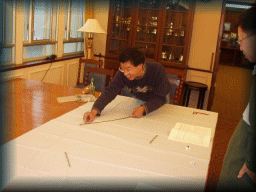 |
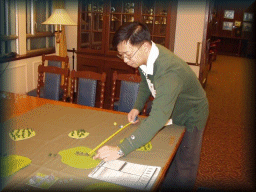 |
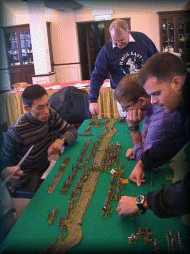 |
|
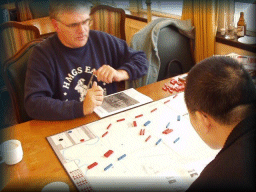 |
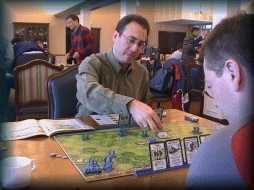
|